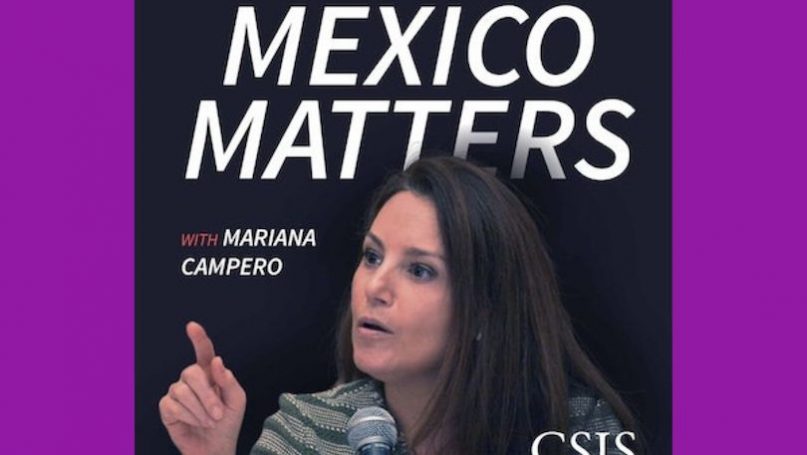
Mexico Matters
Produced by Liz Pulver and hosted by Mariana Campero, from the Center for Strategic and International Studies (CSIS)
Podcast, ongoing since February 2021
English-speaking audiences looking to broaden their understanding on how events occurring in Mexico impact the USA will find valuable information and analysis in the ‘Mexico Matters’ podcast, where experts and personalities involved in the political decision-making processes are invited to discuss relevant themes affecting both territories. This podcast is produced by Liz Pulver and hosted by Mariana Campero, a Non-resident Senior Associate of the Americas Program at the Center for Strategic and International Studies (CSIS) and former CEO of the independent think tank Mexican Council on Foreign Relations (COMEXI).
The first episode came out at a critical moment in February 2021, when after one year of the pandemic Mexico and the USA, like the rest of the world, were still struggling to manage the spread of COVID-19, confronting sickness and millions of deaths. Since the launch of the podcast, Campero has recorded episodes on topical issues, such as electoral periods in Mexico; the reliability of Mexico as a chain supplier; the old NAFTA and new United States-Mexico-Canada Agreement (USMCA); immigration policies; a balance of the three first years of Andrés Manuel López Obrador’s (AMLO) administration; Russia and Latin America’s relationship; among other matters that help to understand the complexity of the US-Mexico relationship in the twenty-first century.
One of the strongest aspects of the program is the quality of the guests it hosts in each episode. They are usually current or former officials, either from the USA or Mexico, who debate alongside academics, researchers or consultants on their topics of expertise. In the case of the Mexican guests, they seem to have an international overview of their own country; and in the case of Americans, they come with an acute knowledge of Mexico. The first episode featured guests such as Kim Breier, former Assistant Secretary of State for Western Hemisphere of the USA, and Luis de la Calle, a Mexican economist and the former Undersecretary at the Ministry of Economy of Mexico who headed the NAFTA negotiations. This episode is a good illustration of the type of personalities that the program regularly hosts.
While some episodes feature only one guest, the great majority have at least two, which helps to diversify the information and ideas discussed. For example, the tenth episode (5 January 2022) presents five experts on Mexican politics, economic, energy, security and diplomatic themes, who overview the first three years of the Presidential administration of AMLO. In addition, each expert ventures to forecast what to expect in the second half of his term as President. They are critical of his administration; they argue with facts why they think the balance is more negative than positive, which comes in contrast with the 60% of acceptance that the Mexican population give him in the polls. Let’s remember that half of the population of Mexico is considered to live in poverty. AMLO has been able to capture their affection by targeting his discourse to the poor with the motto “Primero los pobres” (meaning “The poor first”).
Although each episode focuses on hot topics most relevant at the time of its release, the podcast could still be listened to in retrospect and still surprise the listener with knowledgeable guests, which may change the audience’s perception on one of the most controversial bilateral relationships. That is largely because the guests hold or held senior positions in Mexican or American politics or corporate circles. For example, in the thirteenth episode (18 May 2022), Campero speaks with former congressman Filemon Vela Jr. from Texas. He believes that US immigration policy has undermined the US-Mexico relationship, as politicians from both sides focus more on the negative aspects of migration than on the benefits that this exchange can bring to both nations.
All episodes last around 30 to 40 minutes, which is a good length of time to follow the content of the discussions. However, ‘Mexico Matters’ does not have a fixed periodicity. On some occasions, a couple of months may go by without any new episodes being released, compared to two episodes a month at the beginning. This is one aspect that could be improved, as it may be difficult to become a regular listener if it is not clear when the next program will be published. Nonetheless, following this podcast should be a must for any US-Mexico relations specialists, due to the exclusivity of its guests and of the content it shares. This podcast is providing a needed English-speaking forum on these issues, that is rarely offered by other media outlets. It is an original contribution that could serve as a good source for international academics, politicians, students and the public in general, interested in the US-Mexico relationship, who may not speak Spanish and may want to hear from current or former Mexican as well as American officials about what is occurring within this partnership.